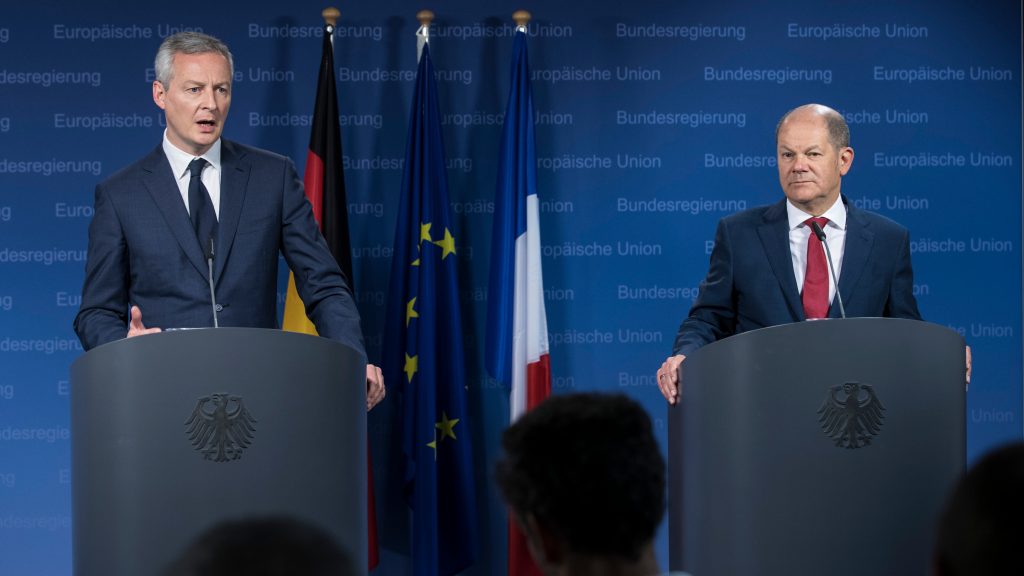
EurActiv (3 December 2018)
Germany and France will outline on Monday a joint proposal for a financial transaction tax for the European Union that is based on a model already tested in France, the Sueddeutsche Zeitung newspaper reported late on Sunday (2 December).
Under the proposal, revenues from the new tax would help fund a euro zone budget, and participating countries would be allowed to use the revenues to offset their contributions to the wider EU budget, the newspaper said.
German Finance Minister Olaf Scholz and French Finance Minister Bruno Le Maire planned to discuss the plan with other EU member states on the sidelines of a finance ministers’ meeting in Brussels on Monday, the report said.
Belgium told to get off the fence, stop blocking FTT
EU finance ministers have presented a compromise text for the Financial Transaction Tax (FTT) and urged Slovakia and Belgium, which is accused of deliberately blocking negotiations, to ratify it. EURACTIV France reports.
The joint position paper described the proposed tax as “an important element” in strengthening the EU, the newspaper said, noting the proposal would be included in the EU financial framework agreement for 2021 to 2027, with a vote seen in 2020.
The proposal is modelled on a system already in place in France where all transactions involving domestically issued shares by companies with a market capitalisation of over 1 billion euros are subject to the tax, Sueddeutsche reported.
The newspaper said France favoured earmarking revenues from the new tax solely for the euro zone budget, while Germany believed some funds could also flow into the overall EU budget.
Le Maire and Scholz want to discuss the proposal with Belgium, Greece, Italy, Portugal, Austria, Slovenia and Slovakia, but must also address what will happen to revenues collected by those that already have such a tax, namely France, Belgium, Italy and Greece.
France and Germany are working on a plan that calculates offsets for those countries that could not expect to generate much or any revenue from the proposed tax because their companies are too small, the newspaper said.
FTT blockage illustrates pitfalls of multi-speed Europe
As France, Germany, Spain and Italy meet to perfect their vision of a future multi-speed Europe, the stalemate over the Financial Transaction Tax (FTT) raises the question of whether some states are capable of working together efficiently. EURACTIV France reports.
Background
In September 2011, the European Commission published a detailed proposal for a tax on financial transactions.
For four years, member states have been unable to reach an agreement on how this new tax should be implemented. Under the proposal, the FTT would apply to all financial transactions, except the primary market and bank loans. Transactions on shares and bonds would be taxed at 0.1%, and derivative products at 0.01%. The FTT would have to be paid if at least one of the parties is based in the EU.
As the member states have failed to come to a global consensus, 11 countries have launched an ‘enhanced cooperation’ mechanism, which will allow at least 9 member states to progress on issues of common interest, without being held up by the other countries.
The 11 countries working on the Financial Transaction Tax project are: France, Germany, Austria, Belgium, Spain, Estonia, Greece, Italy, Portugal, Slovakia and Slovenia. Estonia finally withdrew from the project.
No comments yet.
- BOSNIANS ETHNICALLY DIVIDED OVER NASER ORIC’S ACQUITTAL The Balkans 03.12.2018
- ARMENIA’S ACTING FM TO ATTEND NATO RESOLUTE SUPPORT MEETING The Caucasus and Turkish-Armenian Relations 03.12.2018
- MACEDONIA MOVES CLOSER TOWARDS NAME CHANGE The Balkans 03.12.2018
- ENVOY: IRAN'S TRADE WITH EURASIA TO GROW SERIOUSLY Asia - Pacific 03.12.2018
- LEADING MEP DEFENDS EXPENSES SECRECY Europe - EU 03.12.2018
-
25.01.2016
THE ARMENIAN QUESTION - BASIC KNOWLEDGE AND DOCUMENTATION -
12.06.2024
THE TRUTH WILL OUT -
27.03.2023
RADİKAL ERMENİ UNSURLARCA GERÇEKLEŞTİRİLEN MEZALİMLER VE VANDALİZM -
17.03.2023
PATRIOTISM PERVERTED -
23.02.2023
MEN ARE LIKE THAT -
03.02.2023
BAKÜ-TİFLİS-CEYHAN BORU HATTININ YAŞANAN TARİHİ -
16.12.2022
INTERNATIONAL SCHOLARS ON THE EVENTS OF 1915 -
07.12.2022
FAKE PHOTOS AND THE ARMENIAN PROPAGANDA -
07.12.2022
ERMENİ PROPAGANDASI VE SAHTE RESİMLER -
01.01.2022
A Letter From Japan - Strategically Mum: The Silence of the Armenians -
01.01.2022
Japonya'dan Bir Mektup - Stratejik Suskunluk: Ermenilerin Sessizliği -
03.06.2020
Anastas Mikoyan: Confessions of an Armenian Bolshevik -
08.04.2020
Sovyet Sonrası Ukrayna’da Devlet, Toplum ve Siyaset - Değişen Dinamikler, Dönüşen Kimlikler -
12.06.2018
Ermeni Sorunuyla İlgili İngiliz Belgeleri (1912-1923) - British Documents on Armenian Question (1912-1923) -
02.12.2016
Turkish-Russian Academics: A Historical Study on the Caucasus -
01.07.2016
Gürcistan'daki Müslüman Topluluklar: Azınlık Hakları, Kimlik, Siyaset -
10.03.2016
Armenian Diaspora: Diaspora, State and the Imagination of the Republic of Armenia -
24.01.2016
ERMENİ SORUNU - TEMEL BİLGİ VE BELGELER (2. BASKI)
-
AVİM Conference Hall 24.01.2023
CONFERENCE TITLED “HUNGARY’S PERSPECTIVES ON THE TURKIC WORLD"









